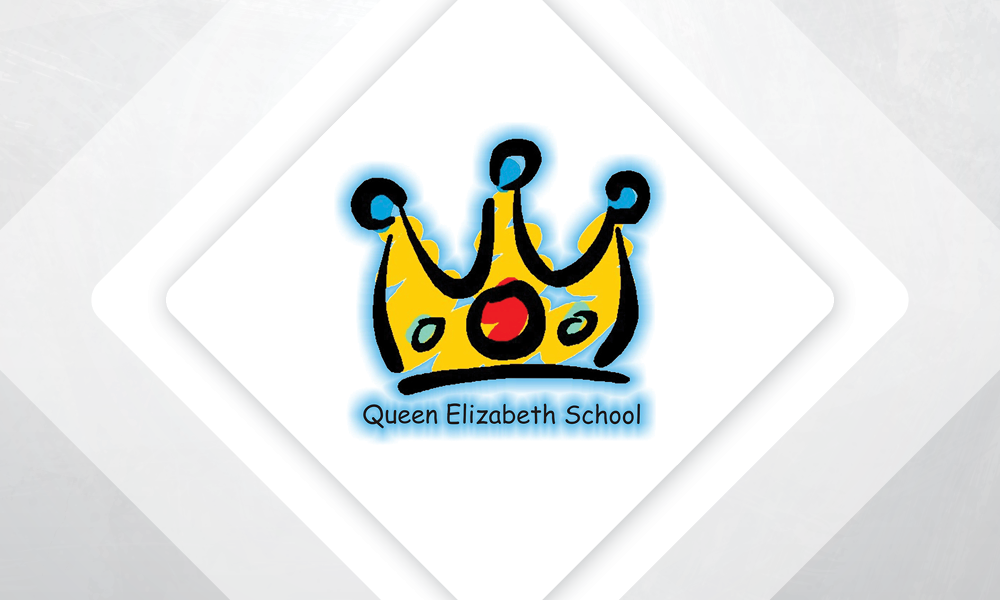Meeting the team
Cornerstones curriculum resources have been written so that schools can use them flexibly by adapting them to suit the needs of the children. QEII School in Horsham is a great example of doing exactly that. The school has children aged 2–19, all of whom have profound learning difficulties. Many also have other needs, such as physical, medical and sensory, or are on the autistic spectrum.
I was given the delightful task of delivering the award to the school, where I met with Headteacher Helen Elphick and a fellow member of the teaching team, Stephen Candy. Three of the children from the award-winning video entry, Kaiden, Isaac and Sarah, were very keen to show me around their fabulous, friendly school. At the time of the visit, there was lots of construction taking place for a new building, which will be named ‘Discovery Island’. The island theme is inspired by one of the student’s favourite Cornerstones thematic projects, Alchemy Island, and Cornerstones’ pedagogy of Engage, Develop, Innovate and Express. They have named their four key stages: Discovery Island (EYFS), Curiosity Island (KS1/KS2), Exploration Island (KS3) and Innovation Island (KS4).
Helen explained, ‘We have been using Cornerstones for several years now, and I’m delighted that the hard work of our students has been recognised with this award. We find that our school really benefits from the Cornerstones Curriculum, as it is creative and pinned on quality texts.’
Reflecting through art and design
All of Cornerstones’ resources have been carefully created to help children recall and retain information. During my visit, all three young people talked enthusiastically about what they had enjoyed most about their learning and Sarah told me ‘I liked the Blood Heart project; all the pictures helped me to understand’. It was clear from the displays around the school that they make the most of using art and design to help the students reflect on their learning. In the video, another KS3 student, Bill is clearly very proud of his model that helped him to explain his learning about mountains and rivers. Similarly, as Isaac told me, ‘Making the model island was great. It meant I could see what we had talked about come to life.’ In one of the classrooms we visited, there was yet another impressive display of African face masks inspired by the Maafa project from our sequenced curriculum.
It was clear from their smiles in the photos, taken very professionally by Stephen, how thrilled they were to win the award. In their own words:
Issac: ‘I was really proud of myself when I heard we’d won this prize. I will show my certificate to my grandparents and put it in my portfolio.’
Kaiden: ‘I was really impressed when I found out that we had won the award. I am overjoyed by the fact that we have won. I am going to put my certificate on the wall.’
Sarah: ‘It felt good to get the award. It made me feel happy. I am going to take my certificate home to show my dad!’
Award-winning work
One of the top challenges as primary educators is how to offer every child the same broad, balanced and ambitious curriculum regardless of their learning style or any additional needs. Ofsted includes offering an ambitious curriculum for all learners in its inspection framework, observing how effectively a school’s leaders:
‘adopt or construct a curriculum that is ambitious and designed to give all pupils, particularly disadvantaged pupils and including pupils with SEND, the knowledge and cultural capital they need to succeed in life’.
Education inspection framework, Ofsted
The young people at QEII School show the impact teaching an ambitious curriculum with a range of learning opportunities can have. The ways in which the dedicated teaching team use the projects and resources on Maestro to engage and inspire the children is evident through the children’s passionate accounts of their learning journey and the creative displays around the school. Adapting the projects to meet their children’s needs has clearly given each young person the confidence and skills to learn more and succeed.



